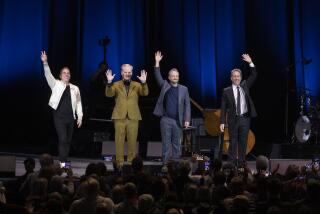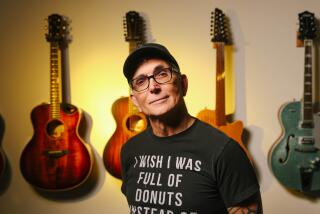LIFE IS A CABARET FOR SINGER-PIANIST ROSS
- Share via
When the people behind the bookings at the Hollywood Roosevelt Hotel’s Cinegrill asked singer-pianist Steve Ross to open their “Manhattan Moves West” series earlier this summer, they couldn’t have chosen a more appropriate performer. His successes at locales ranging from the Cafe Carlyle (Bobby Short’s lair) in New York to the Ritz in London have helped throw him into the forefront of contemporary cabaret circles.
But when the traditionalists come to the Cinegrill to hear his renditions of songs by the likes of Noel Coward and the Gershwins (9:30 p.m. Wednesday and Thursday; 9 and 11 p.m. Friday and Saturday, beginning tonight and running through Sept. 20), they’re in for a slight shock.
“I do a Barry Manilow song called ‘All the Time’ and an Elton John song,” Ross explained. “They can be very effective, but sometimes they don’t really observe the standards of songwriting that I like. They use assonance instead of rhyme and they’re not strict enough, and I like to think of myself as a torchbearer.”
The traditionalism becomes more apparent from his song list: He usually slips one or two contemporary pop songs into a show, but mainly packs in Fred Astaire, Eddie Cantor, Julius Monk and Cole Porter, among others.
Ross is regularly compared to Coward and Astaire, and it was the former connection that prompted the Jamaican government to invite him in December, 1984, to give a special performance at Coward’s island home, the Firefly, to commemorate what would have been the late playwright’s 85th birthday.
Another reason the Cinegrill booked Ross for the Manhattan series is because he reeks of New York. A dead ringer for Henry Fonda (circa “The Grapes of Wrath”), Ross has been living in New York only since he was 29. But a look at his dapper veneer (complete with his trademark wing-tipped collar) recalls the city.
“I’m a New Yorker. I’m proud of it,” he said.
Ross was raised outside of Washington and fresh out of high school became a Jesuit seminarian. In 1958 he quit the religious order and began studying classical languages at Georgetown University while playing the piano in roadhouses. Playing in hospital wards, his passion for music persisted from 1961 to 1963 while he was in the army in Tacoma, Wash.
“I was playing music through everything,” he said.
In 1963, he returned to civilian life in the Washington area, working in lounges and with dance bands for five years. Then he hit New York City.
“(Washington) was fun but I was getting bored. I kept reading the New York Times and said to myself, ‘Why don’t you just move there?’ ” Ross soon found venues that were receptive to his music, while augmenting his schedule by coaching. Working his way up the rungs, his reputation grew, and so did the accolades.
Through it all (including a 1985 world tour that hit Sydney, Australia; Sao Paolo, Brazil; Venice, Italy and Gstaad, Switzerland), Ross has had to deal with the oscillating popularity of cabaret.
“The more fashions change, the more the things which have been accepted as classics are appealing in a way. Although people are always drawn to things that are new, especially in the entertainment business, there is another part of us that wants to keep a foot in the tradition,” he said.
Tradition or not, Ross will cut his first video in 1987.
“(Cabaret) has a classic appeal and these songs have a classic appeal--they’re simple in construction and you know they’re solid,” he said. “I’m very eager to make sure this music stays alive.”
More to Read
The biggest entertainment stories
Get our big stories about Hollywood, film, television, music, arts, culture and more right in your inbox as soon as they publish.
You may occasionally receive promotional content from the Los Angeles Times.










